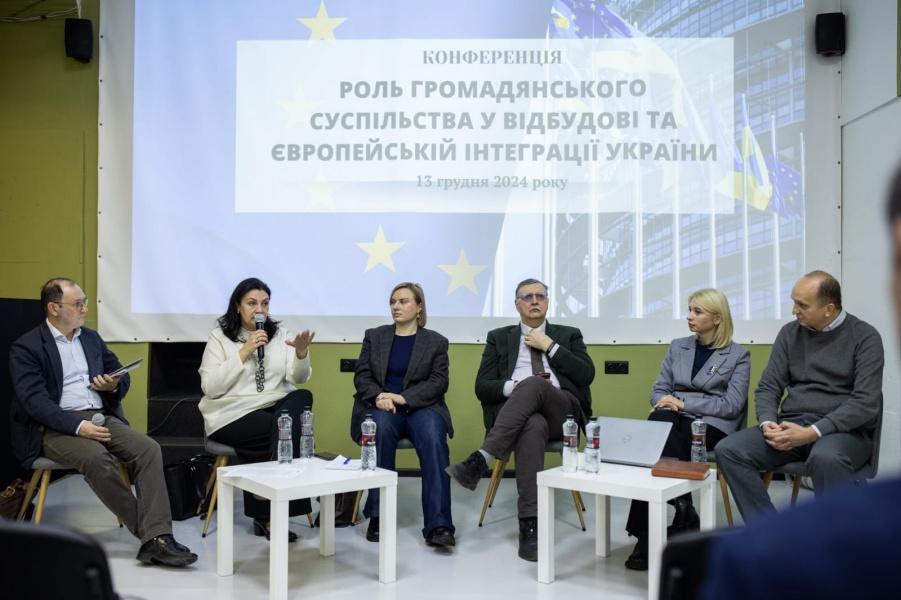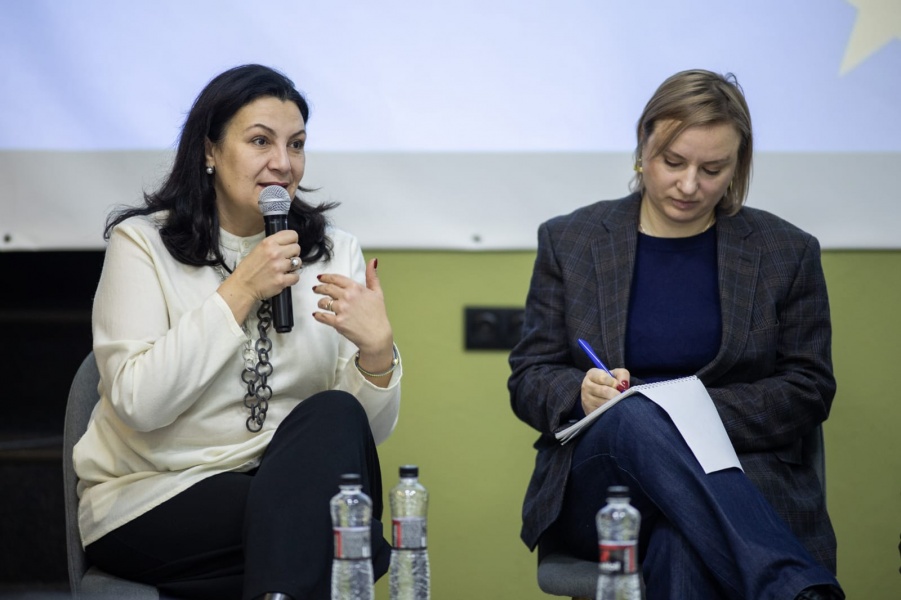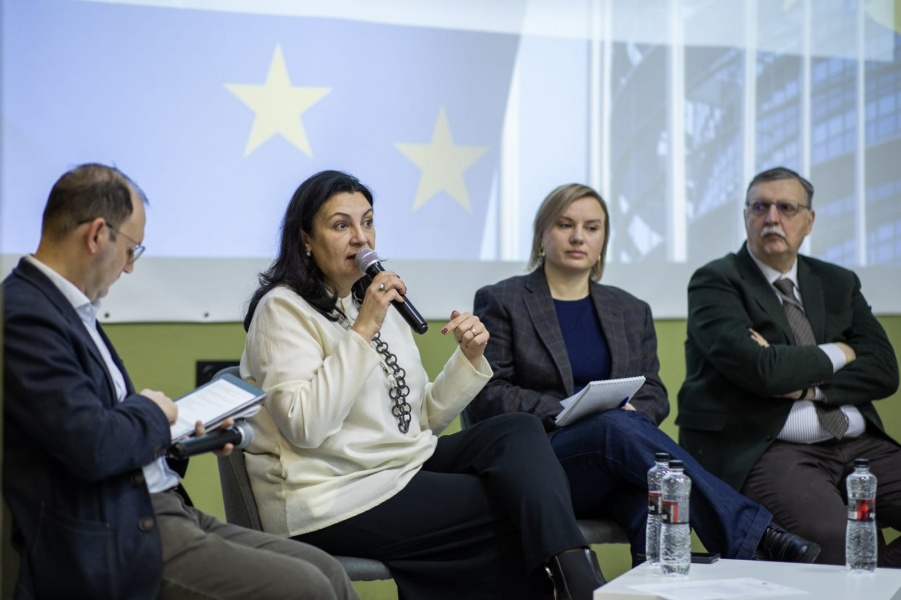
The Chairwoman of the Committee on Ukraine’s Integration into the EU, Ivanna Klympush-Tsintsadze, participated in the conference “The Role of Civil Society in the Reconstruction and European Integration of Ukraine.”
Ivanna Klympush-Tsintsadze emphasised the importance of effective interaction between the Government, the Parliament, civil society, and business in Ukraine’s EU integration. She also outlined tasks and challenges on this path.
The Chair of the Committee called the adjustment of the agricultural sector one of the most difficult elements of European integration. According to her, it will require a strategic approach to counteract manipulation, protectionism by the European Union, and resistance from European farmers accustomed to subsidy policies. “Regardless of whether Ukraine joins the European Union or not, without changing EU agricultural policy, the competitiveness of the European Union in the agricultural market will increasingly diminish. And we can offer a win-win solution,” said the Chair of the Committee. She added that coordinated work of the President, the Government, the Parliament, civil society, media and business associations will be essential to overcome the resistance Ukraine will face.

Ivanna Klympush-Tsintsadze emphasised the need for additional financial instruments from the EU to support Ukraine as it undergoes European integration in unprecedented conditions of war. Therefore, sectors such as energy, civil infrastructure and environment will require significantly more funding. “Unlike any other candidate countries or those that are already negotiating, we have a devastating war on our territory. Certain areas, due to their complexity, will require additional funding to navigate the integration process adequately,” said the Chair of the Committee. Among these sectors, Ivanna Klympush-Tsintsadze named the environment. “We have to adopt new standards, reduce emissions, install equipment, and additionally, counter the ecocide caused by the Russian Federation. We have the largest area of mined land in the world. And this also requires additional funding, without which we will struggle to meet the standards and become equal partners in the European Union,” said the Chair of the Committee. She also emphasised that the current negotiation process with the EU should be based on realistic goals and clear prioritisation. “By focusing on speed in the European integration process, we risk creating major obstacles for ourselves,” said Ivanna Klympush-Tsintsadze.

She noted the important role of civil society in European integration, particularly during the preparation of the EU questionnaire: “Without the involvement of the civil society, the Government would not have been able to fill out the questionnaire. We acknowledge and appreciate this.” The Chair of the Committee on Ukraine’s Integration into the EU also stated that civil society and the analytical community could provide valuable assistance in preparing data across various areas of the economy and trade to prevent manipulation during integration into EU markets. “You have a higher level of trust from our partners than sometimes the Government does, even when the Government presents reliable figures. Civil society can help by highlighting the real situation. And here are the additional things civil society could do: through research, analysis, and publication,” said Ivanna Klympush-Tsintsadze. She is also convinced that civil society can advocate for certain interests of Ukraine both in EU institutions and among EU member states.
Ivanna Klympush-Tsintsadze emphasised the importance of effective interaction between the Government, the Parliament, civil society, and business in Ukraine’s EU integration. She also outlined tasks and challenges on this path.
The Chair of the Committee called the adjustment of the agricultural sector one of the most difficult elements of European integration. According to her, it will require a strategic approach to counteract manipulation, protectionism by the European Union, and resistance from European farmers accustomed to subsidy policies. “Regardless of whether Ukraine joins the European Union or not, without changing EU agricultural policy, the competitiveness of the European Union in the agricultural market will increasingly diminish. And we can offer a win-win solution,” said the Chair of the Committee. She added that coordinated work of the President, the Government, the Parliament, civil society, media and business associations will be essential to overcome the resistance Ukraine will face.

Ivanna Klympush-Tsintsadze emphasised the need for additional financial instruments from the EU to support Ukraine as it undergoes European integration in unprecedented conditions of war. Therefore, sectors such as energy, civil infrastructure and environment will require significantly more funding. “Unlike any other candidate countries or those that are already negotiating, we have a devastating war on our territory. Certain areas, due to their complexity, will require additional funding to navigate the integration process adequately,” said the Chair of the Committee. Among these sectors, Ivanna Klympush-Tsintsadze named the environment. “We have to adopt new standards, reduce emissions, install equipment, and additionally, counter the ecocide caused by the Russian Federation. We have the largest area of mined land in the world. And this also requires additional funding, without which we will struggle to meet the standards and become equal partners in the European Union,” said the Chair of the Committee. She also emphasised that the current negotiation process with the EU should be based on realistic goals and clear prioritisation. “By focusing on speed in the European integration process, we risk creating major obstacles for ourselves,” said Ivanna Klympush-Tsintsadze.

She noted the important role of civil society in European integration, particularly during the preparation of the EU questionnaire: “Without the involvement of the civil society, the Government would not have been able to fill out the questionnaire. We acknowledge and appreciate this.” The Chair of the Committee on Ukraine’s Integration into the EU also stated that civil society and the analytical community could provide valuable assistance in preparing data across various areas of the economy and trade to prevent manipulation during integration into EU markets. “You have a higher level of trust from our partners than sometimes the Government does, even when the Government presents reliable figures. Civil society can help by highlighting the real situation. And here are the additional things civil society could do: through research, analysis, and publication,” said Ivanna Klympush-Tsintsadze. She is also convinced that civil society can advocate for certain interests of Ukraine both in EU institutions and among EU member states.
More posts by topic
“News”
24 November 2025 13:08
20 November 2025 16:14
18 November 2025 12:57
13 November 2025 12:34
12 November 2025 12:31
09 November 2025 12:27
17 October 2025 16:54
15 October 2025 16:52
13 October 2025 16:50
10 October 2025 16:47